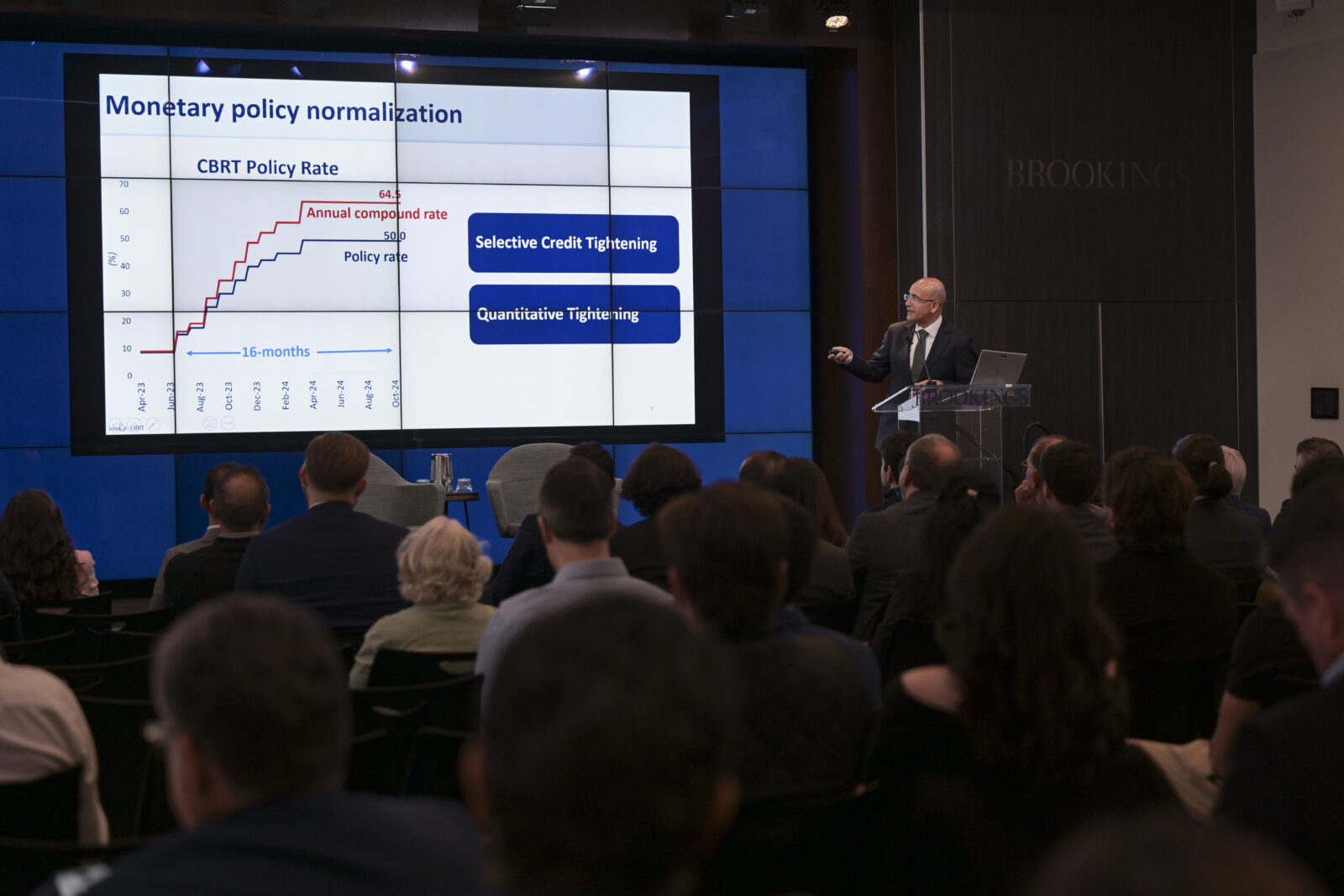Türkiye’s Finance Minister predicts inflation to hit single digits by 2026
 Türkiye's finance minister Mehmet Simsek delivers remarks during an event at the Brookings Institution in Washington, D.C, U.S, on October 25, 2024. (AA Photo)
Türkiye's finance minister Mehmet Simsek delivers remarks during an event at the Brookings Institution in Washington, D.C, U.S, on October 25, 2024. (AA Photo)
During a recent event at the Brookings Institution, Türkiye’s Finance Minister Mehmet Simsek provided an optimistic forecast for the country’s economy, particularly regarding inflation control.
He projected that inflation could drop to single digits by the end of 2026, attributing the positive response to the government’s economic program.
Progress in controlling inflation
Minister Simsek emphasized the importance of declining inflation rates, asserting, “The delayed effects of monetary policy are beginning to take hold. Negative fiscal impulses and a more supportive income policy will accelerate the disinflation process.”
He also noted improvements in firms’ pricing behaviors, suggesting a healthy economic adjustment.
Price stability is crucial, says Finance Minister
Simsek argued that price stability is crucial for sustainable economic growth, insisting that growth and inflation can coexist harmoniously.
He reported a contraction in the current account deficit, driven by increased oil and gas production, energy transformation, and proactive industrial policies, which he believes will support sustainable balance improvements.
The minister pointed to a significant decrease in dollarization as a key factor behind reserve accumulation, highlighting the banking sector’s and real economy’s enhanced foreign debt rollover rates and positive portfolio inflows.
Since August 2023, Türkiye has seen a reduction of over $100 billion in foreign currency-protected deposit accounts.

Investment opportunities in Türkiye
Simsek highlighted Türkiye’s investment potential, citing its population of nearly 90 million and a per capita income of $15,000 as signs of a robust economy.
He noted Türkiye’s impressive growth performance relative to its developing economy peers.
We are not just a large economy; we are also growing rapidly.
Finance Minister Simsek
With over 1 million qualified graduates entering the workforce annually from universities and vocational schools, he emphasized the importance of structural reforms to enhance Türkiye’s production capabilities in medium to high-value-added sectors.
‘Not coincidence attack follows nationalist leader’s statement’
In light of a recent terrorist attack on Turkish Aerospace Industries (TAI) in Ankara’s Kahramankazan, Simsek linked the timing of the incident to political comments made by Nationalist Movement Party leader Devlet Bahceli.
He reaffirmed the PKK’s designation as a terrorist organization, indicating that certain factions continue to resist unity and peace in Türkiye.
“This shows that the PKK is a terrorist organization and that some circles do not want unity and peace,” he added.
‘EU needs Türkiye for deeper integration’
On the topic of Türkiye’s aspirations to join BRICS, Simsek noted that BRICS functions as a dialogue platform, contrasting it with the more structured European Union (EU).
He argued that Türkiye has been an asset to the EU rather than a liability, asserting, “If they truly want deeper integration, they need Türkiye, but their politics are obstructing this.”
He stressed that closer ties between Türkiye and the EU would yield mutual benefits, although he criticized the lack of strategic foresight in European political discourse.
He also acknowledged that potential trade separations could either strengthen ties between Türkiye and the EU or prompt an update to the Customs Union agreement.
Advocating for modernization of the Customs Union to include services, public procurement, and agriculture, he stated that such reforms could double trade volumes in the long term, emphasizing, “Everyone can benefit from this, but politics stands in the way.”
US tax cuts impact emerging markets
Addressing concerns over potential tariffs from U.S. presidential candidate Donald Trump, Simsek declined to comment directly on candidates.
However he remarked that the U.S. budget deficit stemming from tax cuts could lead to rising debt and interest rates, impacting emerging markets like Türkiye.



